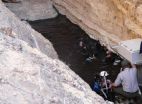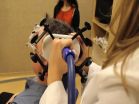(Press-News.org) LEBANON, NH – As the federal government plans its exit strategy from the war, now may be the time for it to rethink its role in providing health care to veterans, says a Perspective piece in the New England Journal of Medicine.
"To simply go on doing more of the same is to fail to recognize the challenge that the Veterans Health Administration's cost and population structure pose in the longer run," said William Weeks, from The Dartmouth Institute for Health Policy & Clinical Practice, and David Auerbach, from the RAND Corporation, in the August issue of NEJM.
The VA incurs high fixed costs of a brick-and-mortar health care system, the largest salaried workforce in the federal government, and a large administration. To sustain this system, the VA has pursued a strategy of increasing enrollment among veterans – about two-thirds of enrollees use VA services – which has led to calls for expanding and building more facilities.
But this growth in enrollment is unlikely to continue because the veteran population is rapidly decreasing, the authors said. In addition, the vast majority of veterans already has access to other health insurance and are not very reliant on the VA system, even before the Affordable Care Act was implemented.
"The bigger and more important question is whether the United States really needs a separate, increasingly expensive, brick-and-mortar health care system for a relatively small and rapidly shrinking population," the authors said.
The authors said a more foundational question would be whether veterans and taxpayers might be better served with true reform, reform that might be accomplished if the VA transitioned out of the hospital business, while perhaps continuing to provide services for which it has special expertise, such as mental health or rehabilitation services.
Funds saved through this transition could be used to help defray veterans' out-of-pocket costs of private-sector health care by subsidizing their premiums, deductibles and co-payments. Such reform could save taxpayers money, save veterans money, improve veterans' access to care, and improve their outcomes from that care.
Pilot tests should be conducted before any sweeping reform takes place on a national level, the authors said. But the recent VA scandal offers an opportunity to more fundamentally reconsider the VA's long-term role in ensuring that veterans have access to affordable, high quality healthcare.
INFORMATION:
To view the Perspective in the New England Journal of Medicine, please go to
http://www.nejm.org/doi/full/10.1056/NEJMp1407535
The Dartmouth Institute for Health Policy & Clinical Practice was founded in 1988 by Dr. John E. Wennberg as the Center for the Evaluative Clinical Sciences (CECS). Among its 25 years of accomplishments, it has established a new discipline and educational focus in the Evaluative Clinical Sciences, introduced and advanced the concept of shared decision-making for patients, demonstrated unwarranted variation in the practice and outcomes of medical treatment, developed the first comprehensive examination of US health care variations (The Dartmouth Atlas), and has shown that more health care is not necessarily better care.
A VA exit strategy
2014-08-28
ELSE PRESS RELEASES FROM THIS DATE:
The universal 'anger face'
2014-08-28
The next time you get really mad, take a look in the mirror. See the lowered brow, the thinned lips and the flared nostrils? That's what social scientists call the "anger face," and it appears to be part of our basic biology as humans.
Now, researchers at UC Santa Barbara and at Griffith University in Australia have identified the functional advantages that caused the specific appearance of the anger face to evolve. Their findings appear in the current online edition of the journal Evolution and Human Behavior.
"The expression is cross-culturally universal, and even ...
Climate change puts endangered Devils Hole pupfish at risk of extinction
2014-08-28
RENO, Nev. – Climate change is hurting reproduction of the endangered Devils Hole pupfish, threatening the survival of this rare species that has numbered as few as 35 individuals, new research by the University of Nevada, Reno and Desert Research Institute shows.
Scientists report that geothermal water on a small shelf near the surface of an isolated cavern in the Nevada desert where the pupfish live is heating up as a result of climate change and is likely to continue heating to dangerous levels.
The hotter water, which now reaches more than 93 degrees, has shortened ...
Deadly remedy: Warning issued about Chinese herbal medicine
2014-08-28
A herbal preparation prescribed by a Chinese herbal medication practitioner in Melbourne for back pain resulted in life-threatening heart changes, prompting a team of intensive care and emergency physicians to call for appropriate patient education by practitioners who prescribe complementary medications.
Writing in Emergency Medicine Australasia, the journal of the Australasian College for Emergency Medicine, emergency medicine trainees Dr Angelly Martinez and Dr Nicky Dobos from the Intensive Care Unit at the Royal Melbourne Hospital and emergency medicine trainee Dr ...
Are cigarette substitutes a safe alternative? It depends on user habits
2014-08-28
CORAL GABLES, Fla (Aug. 26, 2014)-- Cigarette smoking kills approximately 440,000 Americans each year, according to the Centers for Disease Control and Protection. It's the leading cause of preventable death worldwide. In order to overcome this addiction, many people resort to nicotine replacement therapies.
A recent literature review study by researchers at the University of Miami (UM) suggest that small dosages of nicotine found in cigarette substitutes could be harmful to human musculoskeletal system, due to overuse. The findings are reported in the Global Journal ...
From bite site to brain: How rabies virus hijacks and speeds up transport in nerve cells
2014-08-28
Rabies (and rabies virus, its causative agent) is usually transmitted through the bite of an infected animal into muscle tissue of the new host. From there, the virus travels all the way to the brain where it multiplies and causes the usually fatal disease. An article published on August 28th in PLOS Pathogens sheds light on how the virus hijacks the transport system in nerve cells to reach the brain with maximal speed and efficiency.
Pathogens that travel in the blood can spread throughout the body without much effort, courtesy of the heart's pumping action. Those traveling ...
Genomic sequencing reveals mutations, insights into 2014 Ebola outbreak
2014-08-28
In response to an ongoing, unprecedented outbreak of Ebola virus disease (EVD) in West Africa, a team of researchers from the Broad Institute and Harvard University, in collaboration with the Sierra Leone Ministry of Health and Sanitation and researchers across institutions and continents, has rapidly sequenced and analyzed more than 99 Ebola virus genomes. Their findings could have important implications for rapid field diagnostic tests. The team reports its results online in the journal Science.
For the current study, researchers sequenced 99 Ebola virus genomes collected ...
Radio telescopes settle controversy over distance to Pleiades
2014-08-28
Astronomers have used a worldwide network of radio telescopes to resolve a controversy over the distance to a famous star cluster -- a controversy that posed a potential challenge to scientists' basic understanding of how stars form and evolve. The new work shows that the measurement made by a cosmic-mapping research satellite was wrong.
The astronomers studied the Pleiades, the famous "Seven Sisters" star cluster in the constellation Taurus, easily seen in the winter sky. The cluster includes hundreds of young, hot stars formed about 100 million years ago. As a nearby ...
New research reveals how wild rabbits were genetically transformed into tame rabbits
2014-08-28
The genetic changes that transformed wild animals into domesticated forms have long been a mystery. An international team of scientists has now made a breakthrough by showing that many genes controlling the development of the brain and the nervous system were particularly important for rabbit domestication. The study is published today in Science and gives answers to many genetic questions.
The domestication of animals and plants, a prerequisite for the development of agriculture, is one of the most important technological revolutions during human history. Domestication ...
Electric current to brain boosts memory
2014-08-28
VIDEO:
Stimulating a region in the brain with non-invasive electrical current using magnetic pulses (Transcranial Magnetic Stimulation) improves memory, reports a new Northwestern Medicine study in Science. The discovery opens...
Click here for more information.
CHICAGO --- Stimulating a particular region in the brain via non-invasive delivery of electrical current using magnetic pulses, called Transcranial Magnetic Stimulation, improves memory, reports a new Northwestern Medicine® ...
Less than $200 million would conserve precious Atlantic Forest in Brazil, say researchers
2014-08-28
Brazil could conserve its valuable Atlantic Forest by investing just 0.01 per cent of its annual GDP, according to a new study.
The Atlantic Forest (Mata Atlântica) is one of the most important and threatened biodiversity hotspots in the world, containing the only living examples of nearly 10,000 species of plant and more bird species than all of Europe.
Situated along the Atlantic coast of Brazil, it once covered an area of nearly 1.5 million square kilometres. Today, the forest is home to more than 130 million people and it covers only 160,000 km2, because of deforestation. ...




